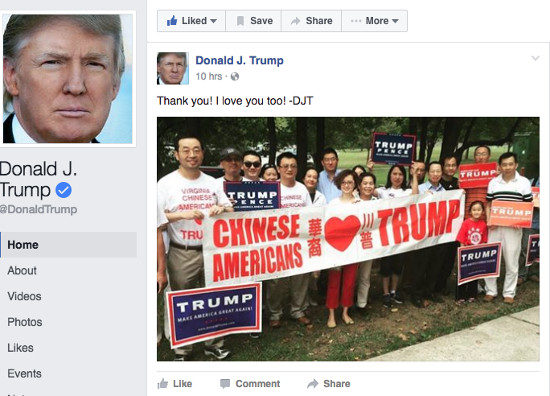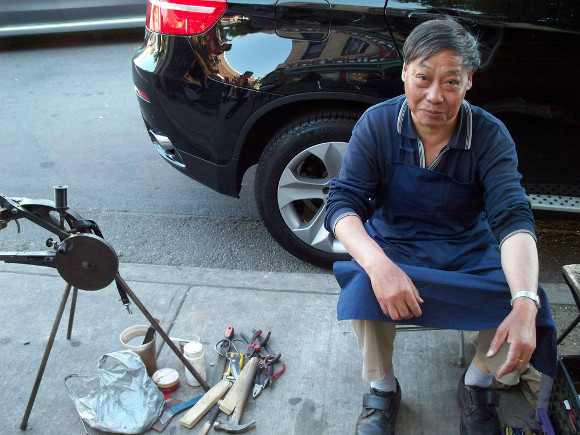They are not non-college, white, working-class men, but they campaigned and voted for Trump.
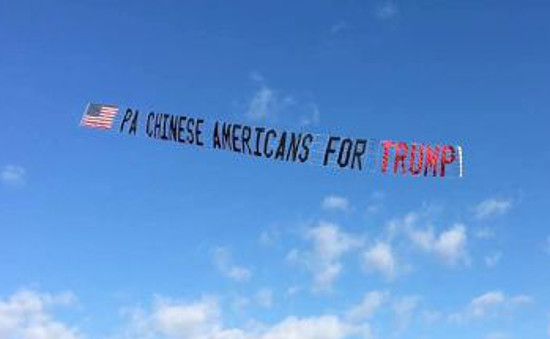
May 10, 2017
Barely 10 days before last year’s presidential election, two airplanes were seen flying around New York City dragging aerial banners behind them. At almost the same time, several planes were also spotted displaying aerial banners with the same message in 10 other cities, including those in key battleground states of Pennsylvania, Wisconsin, North Carolina and New Hampshire. The banners read: Chinese Americans for Trump.
The common perception prior to the November election was that the core of then-candidate Trump’s supporters was non-college, white men with blue-collar jobs. Polls leading to the election were saying that Trump had the support of 76 percent of this segment of the American population.
But organizers of this aerial advertising campaign for Trump did not fit such profile.
Take Xinyeu Lou for example.
In his 50s, Lou graduated from Peking University, one of the elite universities in China, in 1988. He came to New York as an international student in 1993 for his master’s degree at Columbia University. After graduation, Lou worked as a financial journalist, then changed career and worked for a major insurance company. He now runs his own small investment firm.
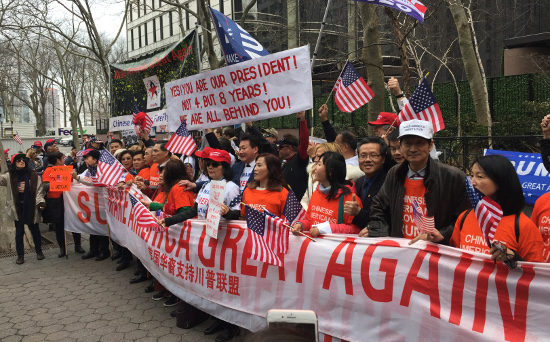
“Like any other first-generation Chinese immigrants, I came here (in the U.S.) by myself, with only a few dollars in my pocket. I studied and worked very hard to chase my American Dream,” Lou said.
He said that for about three quarters of his 23 years in the U.S., he felt he belonged more to the Democratic Party, because it seems to him that it is more inclusive of newcomers.
However, during the eight-year Obama administration, Lou said he felt anxious about what he perceived as the nation’s “swing to the left” and the seeming deterioration of law and order.
Lou said the first time he saw and heard Trump speak was at the Republican National Convention in July. Lou said Trump’s promises to restore law and order, to promote tax cuts and to put American citizens first appealed to him.
Lou claimed the Obama Administration’s policies are unfair to immigrants who came here legally. “How come the illegal immigrants can obtain green cards much easier and faster than the ones who came here legally and pay large amount of taxes for years?” he said.
There are many other Chinese Americans like Lou. A large number of the first-generation Chinese immigrants came to the U.S. to pursue advanced degrees – many of them now hold master’s degrees and even PhDs –and are now working as professionals here in the U.S. Lou said many of them had to wait for about five to 10 years to obtain their employment-based green cards, then waited for another five to 10 to be eligible to apply for citizenship.
That undocumented immigrants can obtain green cards faster than those who were here legally is a common notion within the Chinese American community. But a check with the USCIS website that listed ways that immigrants can get a green card did not support Lou’s claim; the list does not include a path for undocumented ones.
Even President Obama’s 2012 Deferred Action on Childhood Arrivals or DACA does not provide lawful status, and therefore does not lead to legal permanent status to undocumented youth. It only gives immigrants who came to the U.S. as children a temporary permit to live and work here for two years.
Still, several newly arrived Chinese Americans working in the professional field that I talked to share Lou’s sentiments. They point to immigrants within the Chinese community who were able to get their green cards, albeit through fraudulent means.
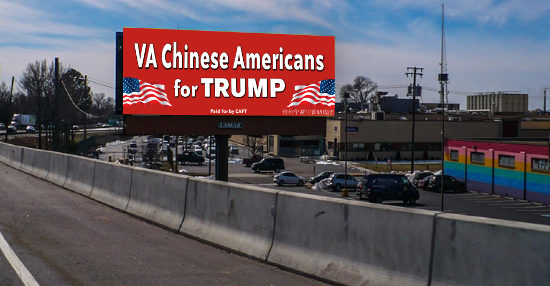
In 2012, federal law enforcement agents raided 10 New York City-area immigration law firms and arrested 26 individuals, including lawyers, who were charged with participating in immigration fraud schemes. According to the indictments, these firms “created and submitted fraudulent applications on behalf of alien applicants and coached them on how to lie to immigration authorities” in order to obtain legal permanent resident (LPR) status, also known as “green card”.
Recently, two “brokers” in Los Angeles were arrested in 2015 for helping arrange marriages of Chinese nationals to American citizens in order to get green cards.
Still, this is not enough proof to support the view that undocumented immigrants can always obtain green cards faster and easier than those who were here legally. According to a Department of Homeland Security report, from 2013 to 2015, there were 22,661 asylum grantees who were originally from China. In contrast, there were at least 325,000 undocumented Chinese immigrants in the U.S, based on a 2016 study by the Pew Research Center.
Like Lou, Guodong Zhang also supported Trump. Zhang is also a graduate of one of China’s top universities and holds an advanced degree from a U.S. university.
An engineer who recently celebrated the 20th anniversary of his coming to America, Zhang said his support for Trump was due to his growing concern over Affirmative Action policies in universities’ admission processes, as well as in some high-tech companies’ recruitment. He blames the Democrats for pushing for Affirmative Action.
Zhang said that the Affirmative Action applied in education and workforce made schools and companies use racial quotas in the admission process or recruitment, which he said tend to discriminate against Asian Americans. He cited the U.S. Supreme Court’s Fisher v. University of Texas decision.
“’They haven’t been in America long enough to experience the civil rights movements and had less enthusiasm about racial and feminism issues in America,’ Dr. Christina Wu said.”
In Fisher v. Texas U, the U.S. Supreme Court voted 4-to-3 to reject the challenge to the Affirmative Action admission process at the university. Zhang took this as a reason to elect a Republican president who will appoint a conservative justice and stop what he perceived as a “rapidly left-leaning” American nation, which he said is so far away from Chinese values.
“A Hillary Clinton presidency would have been just another four years of Obama. Clinton will not make any change, let alone turn the situation around.” Zhang said. “The current America is not the same as the ‘American Dream’ we chased for years.”
Affirmative Action in colleges and universities is a policy aimed at providing equal access to education for marginalized or underrepresented groups, such as women and minorities. For Zhang and many Chinese new immigrants who share the same view, Affirmative Action discriminates against academically deserving Chinese.
But Asian Americans Advancing Justice (AAJC) and the Asian American Legal Defense and Education Fund (AALDEF) believe that Affirmative Action actually benefits Asian Americans as a whole.
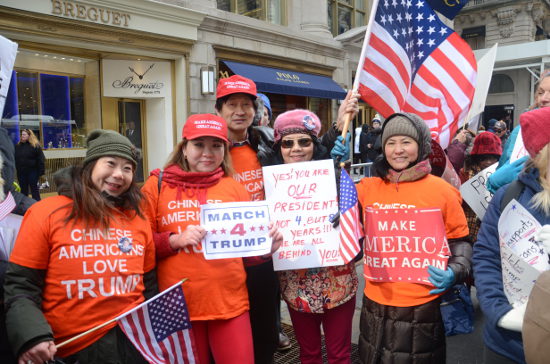
“Contrary to popular and damaging beliefs that Asian Americans and Pacific Islanders (AAPIs) are universally successful in academics and enjoy easy access to universities, many AAPIs, including Southeast Asian, Native Hawaiian and Pacific Islanders, face serious barriers to higher education. Race-conscious admissions programs open the doors of higher education and continue to benefit many AAPI students today. No evidence in the record from Fisher supports the erroneous claim that AAPIs are harmed by the university’s use of holistic admissions. In fact, the opposite is true,” AALDEF said in the statement.
AALDEF also disputed the allegation that Affirmative Action discriminates against Chinese Americans. According to the organization, when a university denies admission to an applicant based on race, sex, religion, or national origin, that’s not because of affirmative action, “that’s negative action.”
Negative action is the rejection of non-White applicants solely because of their race or for factors related to their race.
“An Asian applicant who is the victim of negative action would have been admitted if she or he were White,” AALDEF said. “In the past, universities have used negative action against minorities to preserve the traditional White character of colleges. Today, this can take the form of legacy and donor admissions.”
Dr. Christina Wu, a media studies professor at Hofstra University, attributed the Chinese American support for Trump to the rise of Chinese social media and the newly arrived Chinese immigrants’ lukewarm attitude towards civil rights and political correctness.
Wu, whose research focuses on the crossroads of popular culture, politics, new media and civic engagement, said that the booming of Chinese social media, such as WeChat, in 2016 played a significant role in mobilizing and organizing Trump’s Chinese supporters.
“’This whole generation who grew up in Mainland China is from a society that admires rich and successful people. Trump is a billionaire so that attraction is there,’ said Peter Kwong.”
When Lou and four other active Chinese “Trump fans” in the New York City area came up with the aerial banner idea, they used WeChat to generate support. They set up a PayPal account to raise funds and spread the word through WeChat. In less than a week, other Chinese Trump supporters sent in money.
Dr. Wu identified the majority of Chinese Americans who supported Trump as newly arrived immigrants. “They haven’t been in America long enough to experience the civil rights movements and had less enthusiasm about racial and feminist issues in America,” she said.
Chinese society is not conscious about political correctness, Dr. Wu said, adding that these new Chinese immigrants may have felt stressed and constrained by what they perceive as the PC culture here. They may have been sincerely worried by the expansion of Affirmative Action, which they blame on the Democrats, Dr. Wu added. To those who supported Trump, Affirmative Action is discriminatory against Chinese Americans.
Trump’s anti-mainstream posturing, his pronouncement about “no time for political correctness” as well as his conservative stand on social issues during the campaign, touched a sensitive chord within the new immigrants, the first-generation and those born and raised here in America, Dr. Wu said.
A recent report released by AALDEF on April 18 tends to support Dr. Wu’s analysis. According to the report, foreign-born Asian American voters showed more support for Trump. The Republican candidate got only 8 percent of Asian voters born in the U.S., but got 22 percent of the votes of those who recently became naturalized citizens.
Moreover, 26 percent of Asian Americans who have limited English proficiency voted for Trump; in contrast, only 15 percent of Asian voters who are fluent in English voted for him, according to the same report, which was based on AALDEF’s exit poll of 13,846 Asian American voters in last year’s elections.
But for Peter Kwong, a professor at Hunter College of the City University of New York, the support for Trump among the Chinese newcomers was not a surprise. “This whole generation who grew up in Mainland China is from a society that admires rich and successful people. Trump is a billionaire so that attraction is there,” said Kwong, who is considered an authority on Chinese American communities and Chinese immigration.
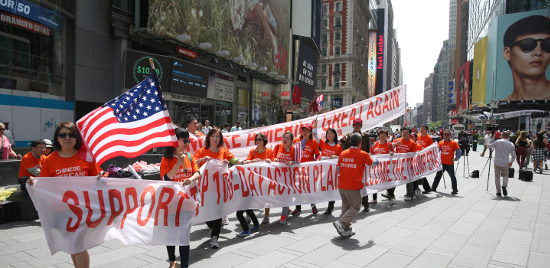
Kwong mentioned that since the 1960s, first-generation Chinese immigrants and those from other waves of immigration have always shared a common goal: to pursue equal opportunities in this land of dreams.
Majority of first-generation Chinese immigrants, especially professionals from the mainland, hate socialism, which they have experienced first-hand when they were still in China. They believe they earned the right to reap the rewards of their individual efforts, and have been fed up with big-government control based on their own experience in their home country, Kwong said.
“Historically, Chinese people have always been in a very unequal society and there is little sympathy for the poor. The idea is if you don’t study and you don’t work hard, then you deserve to be poor,” Kwong said.
Donald Trump thanks his Chinese supporters on his Facebook account during the campaign.
Kwong debunked the notion that the Chinese American community has traditionally been a strong Democrat base. He pointed out that Chinese Americans had been leaning Republican for a long time until 2008. According to Kwong, the majority of Chinese votes switched to Democrats in 2008 and voted for then-candidate Barack Obama.
“Obama is a symbol of the success of minorities and he represented the success story that was very inspirational,“ Kwong said. “So a lot of Chinese Americans voted for Obama, even if they lean Republican.”
For Kwong, the 2016 election signaled the return of the older-generation Chinese Americans to their Republican leaning. “If Trump didn’t come out with those crazy things against immigrants and minorities, he would have gotten more Chinese votes,” Kwong asserted.
AALDEF, in the same exit poll report, supported Kwong’s point about the swing towards Republicans. According AALDEF, although Clinton won 73 percent of Chinese American voters, it is still pales in comparison to Obama’s 81 percent share in the 2012 presidential election. It’s easy to see that a significant number within the community flipped and backed Trump, who got 24 percent of the Chinese American votes.
Kwong said he believes that the younger generation – the ABCs, or American-Born Chinese – who grew up mostly in more progressive blue states such as New York and California, will gravitate towards what they believe is a more minority-inclusive Democratic Party.
“The divide is always there. And the divide will remain within the Chinese American community forever,” Kwong said.
EDITOR’S NOTE: Professor Peter Kwong, who has taught at Hunter College since 1993, passed away on March 17, before this article could be published. He was a pioneer in Asian American studies, and considered the foremost authority on Chinese Americans and on modern Chinese politics.
Professor Kwong was the inaugural director of the Asian American Studies Program at Hunter. He was also a journalist, a documentary filmmaker and an author.
